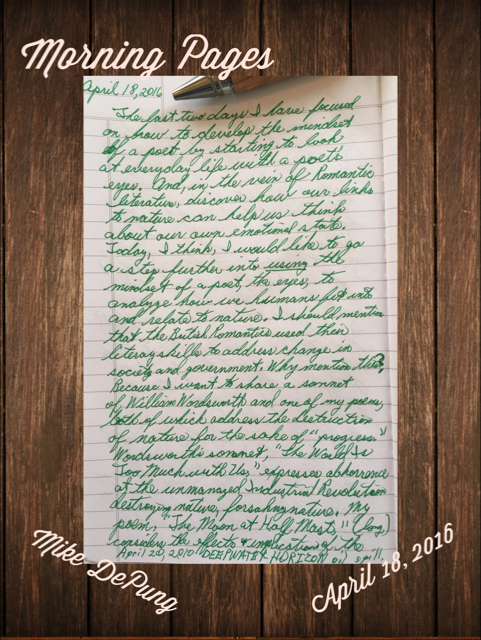 Making a Difference: Humans, Nature, and PoetryHow can poetry or literature be practical? I hope the last two days gives some insight. Viewing the world through the eyes of a poet with a poet’s mindset can help us become more aware of self and can help us have a more positive mindset. Today, let’s think about the bigger picture of how we humans as a race relate to nature and to one another. One thing we have not understood: when we engage in actions and activities that destroy nature, it not only grieves the universe but also will destroy us. Now, some do not care as long as they have every desirable convenience. Turns out that’s exactly the way Romantic writers felt during the Industrial Revolution, a time when opportunists exploited technology to make money while destroying nature and lives on a wholesale level — 5–9 year old children working in coal mines and cleaning smokestacks; air so polluted that it constantly sickened whole populations; forced squalor for large percentages of the population. Hmm? Any of this sound familiar? No? Global warming, technology being employed without beginning to understand long term consequences, destruction of rain forests — any more? Yeah, lots. Oh, wouldn’t want to forget the insatiable drive to exploit nature for the insatiable need for oil. William Wordsworth, one of the leaders of the Romantic movement, saw the developing problems. Romantics were very much about progress, but they envisioned societal progress based on leaders operating on the principle of following their hearts, one tenet of which would be to use nature as a model. Obviously, destruction of nature would be unacceptable. In 1807, Wordsworth published a sonnet based on what he saw occurring in England. I’m just going to let you read it. The World Is Too Much with Us The world is too much with us; late and soon, Getting and spending, we lay waste our powers; Little we see in Nature that is ours; We have given our hearts away, a sordid boon! This Sea that bares her bosom to the moon; The winds that will be howling at all hours, And are up-gathered now like sleeping flowers, For this, for everything, we are out of tune; It moves us not. — Great God! I’d rather be A pagan suckled in a creed outworn; So might I, standing on this pleasant lea, Have glimpses that would make me less forlorn; Have sight of Proteus rising from the sea; Or hear old Triton blow his wreathèd horn. Entrepreneurs of the Industrial Revolution rationalized the ills suffered by society from their endeavors; big corporations, oligarchies, and certain sectors of government do the same things today. The Romantics served as a galvanizing force in their time, playing a role in the reforms of 1832 and 1844. We can, if we use our poet’s eyes and mindset, positively affect our society, too. You see, on April 20, 2010, the Deepwater Horizon oil rig exploded. I will share some thoughts about that, which is why I bold-faced one line above. Till then, based on the poem above, maybe these questions will help you think about its impact. 1. What powers are we exposing and ruining for the sake of ease and convenience — “Getting and spending, we lay waste our powers…”? 2. What is “ours” in nature, i.e., what should we be understanding from Nature? 3. How have we “given our hearts away” in the unprincipled pursuit of “progress”?
0 Comments
Leave a Reply. |
Questions to consider:How many times have you asked yourself or simply thought about the following questions?
Who am I, really? What is my truth? How do my actions reveal what I really feel and believe? What would I do with my life if I could do anything? What is my passion? Why am I here? How can I discover answers to any of these questions? If you have considered any of these questions, I hope that my experiences and writing will give you some guidance. Please read my blog and comment and share your thoughts. I would love to hear from you! Archives
December 2019
Categories |

